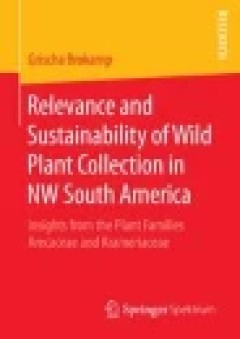Filter by

Relevance and Sustainability of Wild Plant Collection in NW South America
This study focuses on understanding the socio-economic relevance of plant resources collected from the wild and its relation to current patterns of trade and sustainability. Grischa Brokamp reviews and analyzes the current extent of palm trade in northwestern South America, its impact, limitations and future perspective. Indeed there are conflicts between the commercialization of wild plant res…
- Edition
- -
- ISBN/ISSN
- -
- Collation
- -
- Series Title
- -
- Call Number
- -

Regulation of Nutrient Uptake by Plants: A Biochemical and Molecular Approach
This book describes the mechanisms of nutrient taken up by plants at the biochemical and molecular level. This is a new concept developed over the past 30 years, primarily due to use of modern technology developed in biotechnological research, instrumentation, modern computation facilities, bioinformatics, the large volumes of information generated by use of various ‘omics’ and of course th…
- Edition
- -
- ISBN/ISSN
- 9788132223344
- Collation
- -
- Series Title
- -
- Call Number
- -

Pogrom Cries – Essays on Polish-Jewish History, 1939–1946 2nd Revised Ed…
This book focuses on the fate of Polish Jews and Polish-Jewish relations during the Holocaust and its aftermath, in the ill-recognized era of Eastern-European pogroms after the WW2. It is based on the author’s own ethnographic research in those areas of Poland where the Holocaust machinery operated. The results comprise the anthropological interviews with the members of the generation of Holo…
- Edition
- -
- ISBN/ISSN
- -
- Collation
- -
- Series Title
- -
- Call Number
- -

Excavations at Portchester Castle Vol. V: Post Medieval 1609–1819
In the fifth and final report on the excavations at Portchester Castle, the last stage of the castle’s useful life is considered in full. The excavations undertaken between 1961 and 1979 brough to light structural evidence of the various buildings erected during the period 1609–1819, together with a large collection of varied artefacts. This evidence is presented against the backgrounds of …
- Edition
- -
- ISBN/ISSN
- 9780854312641
- Collation
- -
- Series Title
- -
- Call Number
- -

Materials of Culture Approaches to Materials in Cultural Studies
While the so-called material turn in the humanities and the social sciences has inspired a vibrant discourse on objects, things, and the concept of materiality in general, less attention has been paid to materials, particularly in cultural studies scholarship. With each of its chapters taking a particular material as its point of departure, this volume offers a palette of fresh approaches to ma…
- Edition
- -
- ISBN/ISSN
- 9783839466971
- Collation
- -
- Series Title
- -
- Call Number
- -

The Hmong of Australia Culture and Diaspora
United States
- Edition
- -
- ISBN/ISSN
- -
- Collation
- -
- Series Title
- -
- Call Number
- -

Bally - A History of Footwear in the Interwar Period
Carl Franz Bally founded a shoe factory in Switzerland in 1851. Within decades, the Bally name had achieved worldwide recognition for its high-quality footwear. The history of modern footwear can be traced through the lens of Bally's corporate evolution. This book brings together the results of research on such topics as the economic importance of fashion, Bally's fortunes in the US, the career…
- Edition
- -
- ISBN/ISSN
- 9783839457382
- Collation
- -
- Series Title
- -
- Call Number
- 900 BAL b

Ukraine's Many Faces Land, People, and Culture Revisited
Russia's large-scale invasion on the 24th of February 2022 once again made Ukraine the focus of world media. Behind those headlines remain the complex developments in Ukraine's history, national identity, culture and society. Addressing readers from diverse backgrounds, this volume approaches the history of Ukraine and its people through primary sources, from the early modern period to the pres…
- Edition
- -
- ISBN/ISSN
- 9783839466643
- Collation
- -
- Series Title
- -
- Call Number
- -

The Wealthy, the Brilliant, the Few: Elite Education in Contemporary American…
How does the US make sense of its elite educational system, given that it seems to be at odds with core American values, such as equality of opportunity or upward mobility? Sophie Spieler explores scholarly and journalistic investigations, self-representational texts, and fictional narratives revolving around the Ivy League and its peers in order to understand elite education and its peculiar p…
- Edition
- -
- ISBN/ISSN
- 9783839457290
- Collation
- -
- Series Title
- -
- Call Number
- 973 SPI w

Musical Composition in the Context of Globalization: New Perspectives on Musi…
Since the early transformation of European music practice and theory in the cultural centers of Asia, Latin America, and Africa around 1900, it has become necessary for music history to be conceived globally - a challenge that musicology has hardly faced yet. This book discusses the effects of cultural globalization on processes of composition and distribution of art music in the 20th and 21st …
- Edition
- 1
- ISBN/ISSN
- 9783839450956
- Collation
- -
- Series Title
- -
- Call Number
- 780 UTZ m
 Computer Science, Information & General Works
Computer Science, Information & General Works  Philosophy & Psychology
Philosophy & Psychology  Religion
Religion  Social Sciences
Social Sciences  Language
Language  Pure Science
Pure Science  Applied Sciences
Applied Sciences  Art & Recreation
Art & Recreation  Literature
Literature  History & Geography
History & Geography